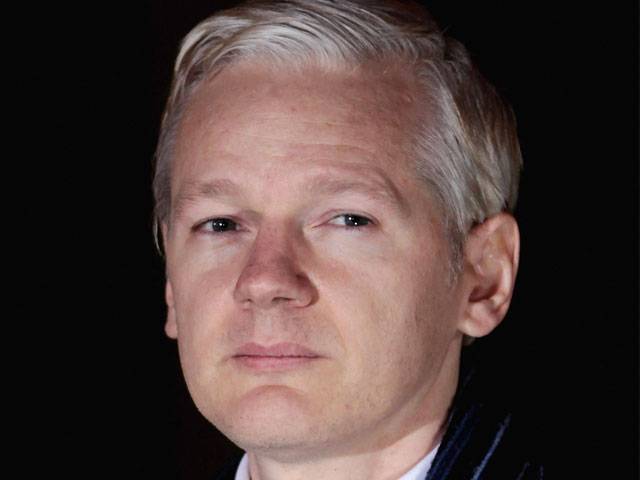MOSCOW - WikiLeaks founder Julian Assange on Tuesday made his debut as a chat show host on a Kremlin-funded channel with a deliberately shocking choice of first guest - the leader of Hezbollah. While still under house arrest in London, the founder of the whistle-blowing website spoke via video link to Hassan Nasrallah. Russia aired the show, called “The World Tomorrow,” with fanfare on its international RT news channel. The multi-lingual channel, which makes no secret of giving the Russian take on world affairs and has the slogan “Question More,” built up anticipation by promising the first guest would outrage many.
“I won’t be surprised if after the first show the hawks want not just to shut down Assange but us as well,” channel director Margarita Simonyan wrote on her Twitter account, while stressing the guest was Assange’s choice.
In his introduction, Assange called Nasrallah “one of the most extraordinary figures in the Middle East,” and said he would examine why he is viewed by some as a “freedom fighter” and others as a “terrorist.”
Speaking from what was described as a secret location in Lebanon, Nasrallah beamed genially as he laid out the group’s position on the Syrian conflict, flanked by the flags of Lebanon and Hezbollah.
He criticised the “American hegemony” and described Israel as an “inimical state” in comments dubbed into English in what the RT described as his “first interview in the West since the 2006 Israel-Lebanon war.”
During the half-hour show, Assange sat at a desk in a small room wearing a creased white shirt, with books and recording equipment visible on shelves behind him.
RT scored a media coup by securing the show, while Assange said in a promotional interview that he had chosen the channel because it had higher penetration in the United States than Al-Jazeera.
Russian observers said the show’s overtly provocative stance was bound to attract attention and in some ways chimed with Russia’s foreign policy, which has featured anti-American statements during the presidential campaign.
“Aiming for scandal is legitimate enough; it’s a successful move for a time. The head of Hezbollah works in this way: he scandalises the audience,” said Maria Lipman, an analyst at Carnegie Moscow Centre.
“But if their aim is to compete with the BBC, CNN and Al-Jazeera, this move more puts them into a niche category, not one aiming for a wide international audience.”
“According to the Anglo-Saxon tradition, such people cannot be given a mouthpiece. RT is trying to break a taboo,” said Anna Kachkayeva, a media correspondent on Radio Liberty.
“It’s curious that a channel run on state money dares to do this. But will it show the people whom Russia does not allow to speak publicly?”
Ahead of the show, Assange said he was bound to face criticism for airing his show on a Kremlin-funded channel.
In an interview to RT, he said he expected to be called an “enemy combatant, traitor (for) getting into bed with the Kremlin and interviewing terrible radicals from around the world.
“If they actually look at how the show is made: we make it, we have complete editorial control,” he said, adding that he had interviewed members of both the Russian opposition and the government.
The 12-episode weekly show is being produced by Assange’s Quick Roll Productions company and RT, which used to be known as Russia Today, has the right to the first airing of the episodes.
Assange has been under house arrest for almost 500 days, awaiting judgment from the Supreme Court in London on whether he can be extradited to Sweden for questioning over allegations of rape and sexual assault.
Friday, April 19, 2024
Assange interviews Hezb chief

8:27 AM | April 19, 2024
8:09 AM | April 19, 2024
Opposition objects to oath-taking of MNAs amid lawlessness
5:15 PM | April 19, 2024
Electioneering to end on Friday night ahead of by-polls in 21 constituencies
5:14 PM | April 19, 2024
Fawad Chaudhry granted bail in 14 cases related to May 9 violence
5:13 PM | April 19, 2024
British Army chief lauds Pakistan Army's professionalism, expertise
5:12 PM | April 19, 2024
Israeli aircraft fire missiles at Air Force assets in Iran: Report
3:52 PM | April 19, 2024
A Tense Neighbourhood
April 19, 2024
Dubai Underwater
April 19, 2024
X Debate Continues
April 19, 2024
Hepatitis Challenge
April 18, 2024
IMF Predictions
April 18, 2024
Kite tragedy
April 19, 2024
Discipline dilemma
April 19, 2024
Urgent plea
April 19, 2024
Justice denied
April 18, 2024
AI dilemmas unveiled
April 18, 2024
ePaper - Nawaiwaqt
Advertisement
Nawaiwaqt Group | Copyright © 2024





